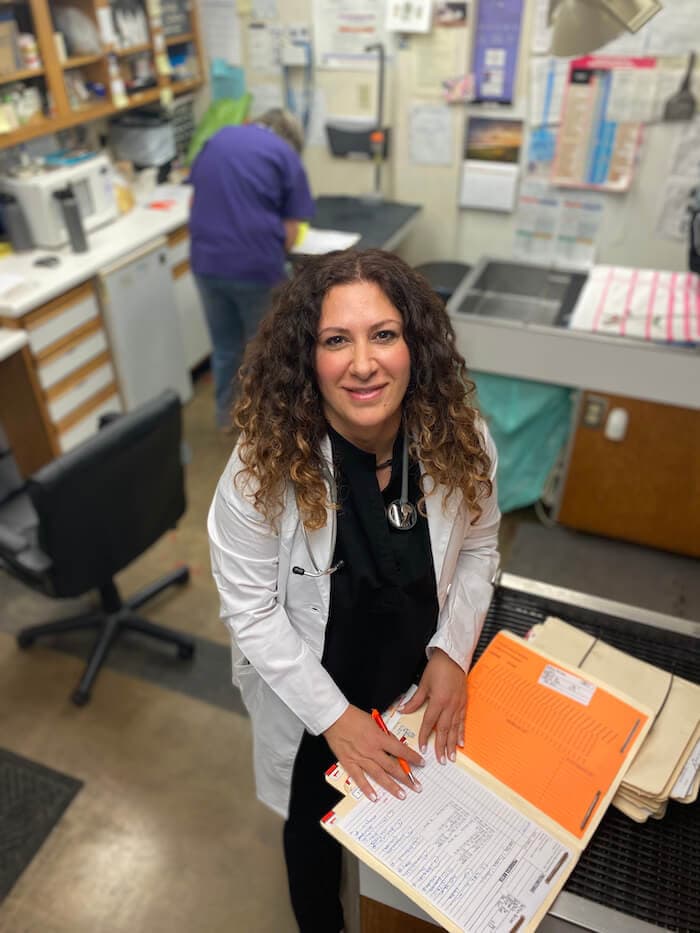Dog Bathing & Hygiene Insights from Veterinarians: How often to wash your dog and so much more!
Bathing and hygiene are crucial components of caring for your dog. Suppose you have turned to the Internet searching for advice regarding your dog’s bathing and hygiene needs. In that case, we strongly suggest speaking with your veterinarian, as not everything you read online is true. Even if you are simply trying to figure out how often your dog needs a bath and what symptoms can be caused by poor hygiene, we believe that pet care information should come from licensed vets — not the well-meaning but often ill-informed keyboard warriors you often encounter online. That’s why, here at GeniusVets, we decided to send some of the most frequently asked questions about dog bathing and hygiene to trusted vets throughout the U.S. and compile their responses to give you the accurate information you can trust.
While we sourced the information below directly from veterinarians, please be sure to contact your own veterinarian for advice regarding your dog’s specific needs. Don’t have one? Find a trusted vet near you using the GeniusVets Directory!
What is a good hygiene regimen for a dog?
The best hygiene regimen for a specific dog varies depending on their lifestyle, breed, and whether they have sensitive skin or other problems. There are a few essential components that your pet’s regimen should include.
Good elements of a dog's hygiene regimen include:
- Bathing
- Regular nail trimming
- Ear cleaning (Try Veterinary Formula Ear Therapy Wipes!)
- Tooth cleaning
- Sanitary trims and anal gland expression if needed
Determine the frequency at which you should perform these tasks based on your pet’s needs and lifestyle. For example, a teacup chihuahua who rarely ventures outside needs baths less frequently than a Labrador who loves rolling around in the biggest mud puddles they can find. If you’re unsure of your dog’s hygiene needs, your veterinarian can give you dog bathing tips.
How often should I be bathing my dog?
In short, the answer to this depends on your dog’s lifestyle. Some dogs need to be bathed once or twice per week, while others can get away with being bathed every few months. A small, short-haired dog who mostly stays inside usually needs infrequent baths, while a large, long-haired breed who loves spending time outside — like a Golden Retriever — may need to be bathed and professionally groomed much more often.
How does keeping my dog clean contribute to good health?
Keeping your dog clean contributes to good overall health in several ways. Dogs who have long hair or spend a lot of time outside often get burrs and other things stuck in their coat. When not removed, they can lead to mats that pull at the skin and cause pain, sores, and infections. Regular bathing prevents these problems. It also prevents skin infections in wrinkly breeds, like Shar Peis, Bulldogs, and Pugs. Cleaning your dog’s teeth and ears prevents infections, too. Performing these tasks regularly also provides an opportunity to keep an eye on your dog’s overall condition and detect changes or abnormalities. Think about how you’d feel if you had poor hygiene and didn’t keep yourself clean. Poor hygiene affects dogs in many of the same ways.
How do I find the right bathing products for my dog?
The most important step is finding products made specifically for dogs. The pH of a dog’s skin is different from that of a human or another animal. Using products not made for dogs can result in excessive dryness or skin irritation. Veterinarians also recommend avoiding strong fragrances. Your dog’s sense of smell is extremely keen, and scented shampoos and colognes can be overwhelming.
Spend some time researching brands like you would when shopping for yourself. Choose products from well-established brands that are dedicated to making safe, high-quality pet care products. Ask for recommendations at your local pet store, or talk to your veterinarian if you need help dealing with dry or irritated skin, severe mats, and other problems that could impact your dog’s health.
Recommended Products for Dog Bathing & Hygiene
Keeping your dog clean and well-groomed is essential for their comfort and health. From shampoos and conditioners to grooming kits and dental care, the following veterinarian-recommended products help maintain skin, coat, ears, nails, and teeth. Whether you're bathing a long-haired pup or trimming nails on a wiggly puppy, these tools and treatments make at-home hygiene more manageable.
Shampoos, Conditioners & Leave-On Treatments
- Hypoallergenic Dog Shampoo – Gentle formula for sensitive skin.
- Veterinary Formula Hypoallergenic Dog Shampoo – Soap-free and fragrance-free for allergy-prone pets.
- DOUXO® Skin & Coat SPA - Ultra-Safe Quick Refresh Leave-on Mousse for Dogs – No-rinse treatment that soothes and nourishes the skin between baths.
- DOUXO® Skin & Coat SPA - Ultra-Safe Dog Shampoo for Itchy Skin – Cleans and soothes while leaving the coat soft and radiant.
- DOUXO® Skin & Coat SPA - Ultra-Safe Oatmeal Dog Conditioner – Detangles and moisturizes for a soft, silky coat.
- Pet-Ag Fresh ’n Clean Scented Shampoo – 18 oz – Classic fresh scent with moisturizing Vitamin E & Aloe Vera.
- PetAg Fresh ’n Clean Scented Shampoo – 1 Gallon – Bulk size for multi-dog homes or frequent baths.
- PetAg Fresh ’n Clean Cologne Spray – Floral scent that controls odor between baths.
- Veterinary Formula Clinical Care Hot Spot & Itch Relief Medicated Shampoo – Calms inflamed and itchy areas.
- Veterinary Formula Clinical Care Antiseptic & Antifungal Medicated Shampoo – Helps manage skin infections.
- Veterinary Formula Clinical Care Hypoallergenic Shampoo – Extra-mild option for sensitive or allergy-prone pets.
- Virbac Allergroom Pet Shampoo For Dogs, Cats & Horses – Soap-free, moisturizing care for dry or allergy-prone skin.
- ZYMOX Advanced Enzymatic Leave-On Conditioner, 12oz. – Leave-on formula that conditions, detangles, and soothes.
- CeraSoothe® CHX+KET Antiseptic Shampoo 16oz – Antibacterial and antifungal support.
- CeraSoothe® CHX+MC Antiseptic Shampoo 16oz – Helps support a healthy skin microbiome.
- Dechra MiconaHex + Triz Shampoo for Dogs, Cats & Horses – Medicated relief and cleansing for troubled skin.
- 4 Spray Conditioner for Dogs, Cats and Horses – Quick, convenient daily coat conditioning.
| Product | Main Purpose | Best For |
|---|---|---|
| Hypoallergenic Dog Shampoo | Gentle cleansing for sensitive skin | Dogs with mild skin sensitivities |
| Veterinary Formula Hypoallergenic Dog Shampoo | Fragrance- and soap-free cleansing | Allergy-prone dogs; contact/environmental sensitivities |
| DOUXO® Leave-on Mousse | No-rinse soothing and coat nourishment | Dogs needing between-bath skin support |
| DOUXO® Dog Shampoo for Itchy Skin | Cleanses and soothes itchy, sensitive skin | Routine bathing for itchy/sensitive dogs |
| DOUXO® Oatmeal Dog Conditioner | Moisturizing detangler and coat reviver | Dry coats; dogs needing extra softness |
| Fresh ’n Clean – 18 oz | Scented shampoo with moisturizers | Routine bathing; odor control |
| Fresh ’n Clean – 1 Gallon | Bulk-size scented shampoo | Multi-dog homes; frequent bathers |
| Fresh ’n Clean Cologne Spray | Between-bath deodorizing | Dogs needing quick odor control |
| Hot Spot & Itch Relief Shampoo | Soothes hot spots and itching | Dogs & cats with irritated skin |
| Antiseptic & Antifungal Shampoo | Medicated cleansing for infections | Dogs & cats with bacterial/fungal issues |
| Clinical Care Hypoallergenic Shampoo | Ultra-mild, pH-balanced wash | Dogs & cats with sensitivities |
| Virbac Allergroom | Soap-free, moisturizing formula | Dogs, cats & horses with dry/allergic skin |
| ZYMOX Leave-On Conditioner | Conditioning, detangling, soothing | Pets needing leave-on skin/coat support |
| CeraSoothe® CHX+KET Shampoo | Antibacterial & antifungal support | Recurring skin infections |
| CeraSoothe® CHX+MC Shampoo | Supports healthy skin microbiome | Chronic/reactive skin |
| Dechra MiconaHex + Triz | Medicated relief and cleansing | Dogs, cats & horses prone to infections |
| 4 Spray Conditioner | Quick daily coat conditioning | Dogs, cats & horses between baths |
Top Pick
Looking for a gentle, everyday shampoo? Try the DOUXO® Skin & Coat SPA – Ultra-Safe Dog Shampoo for Itchy Skin. It’s a reliable, ultra-safe option that leaves your dog’s coat clean, soft, and comfortable.
What should I do if my dog has skin infections regularly?
Scheduling a vet appointment is the best option for dogs who experience skin infections regularly. A veterinarian can prescribe antibacterial, antifungal, and other medicated shampoos that are appropriate for your pet. There are also special shampoos and other products that contain antihistamines for dogs with allergies.
Is brushing my dog's teeth important to overall hygiene?
Absolutely! Brushing your dog’s teeth is one of the most important things to do to keep your canine companion healthy. Brushing eliminates plaque and bacteria and prevents tooth decay, gingivitis, and oral infections.
Need a complete dental solution? The Vet's Best Toothbrush and Toothpaste Set offers an easy way to keep your dog’s teeth healthy and breath fresh.
Try the Vet's Best Dental Set Here
Dogs who don’t have their teeth brushed regularly experience several problems, including:
- Bad breath
- Inflamed gums
- Infections in the teeth and gums
- Pain
- Tooth loss
- Damage to the heart, kidneys, and liver
In dogs, oral hygiene isn’t just about making sure they have fresh breath and pearly white teeth. It’s about preventing serious health complications. Talk to your dog’s veterinarian to learn more about how to safely brush their teeth at home and what products to use. (Tip from the Vet: Start with this Finger Tooth Brush when your dog is a pup!)
Why is it important to regularly clean my dog's bed, bowls, collar, leash, and toys?
Imagine if you wore the same clothes every day and never washed your sheets or dishes. They’d get pretty gross, right? The same goes for your dog’s bed, bowls, collar, leash, and toys. Hair, dander, dirt, and oil buildup on soft surfaces, and nasty films build up in food and water dishes. Pet supplies that aren’t cleaned regularly are coated in bacteria, and in the case of food and water bowls, they can even attract insects and parasites.
You should clean your dog’s…
- Food and Water Bowls: Daily
- Collar and Leash: Every few months
- Bedding: Weekly
Remember to wash your dog’s toys regularly, too! Like anything else, they can become coated in potentially harmful bacteria if you never clean them.
What are some signs and symptoms of poor hygiene in my dog?
Poor hygiene can cause a wide range of symptoms in dogs. While some are relatively minor, others indicate serious underlying health issues.
Common signs of poor hygiene in dogs include:
- Matted fur
- A dull coat
- Dry, itchy skin
- Greasy fur
- Unpleasant odor
- Bad breath
- Tooth discoloration
- Scooting or smelly rear end
- Smelly ears
- Wax buildup in ears
Pay attention to your dog’s overall condition and behavior. Do they appear healthy and well-groomed? Are they scratching more than usual? Or licking? Are they having trouble getting around? Do they stink? Examine your dog regularly, and give them a good scrub if they seem dirty. And, of course, contact their veterinarian if you spot any serious issues, like skin sores, infections, etc.
Is there any other advice for bathing my dog from the veterinarian?
Your veterinarian is the best source of information regarding your dog’s hygiene. They can help with everything from dealing with an unpleasant odor and treating sensitive skin to teaching you how to brush your dog’s teeth at home and trimming their nails. Building a relationship with a skilled veterinarian is the best way to stay on top of your dog’s hygiene and deal with any problems that may arise.
Other Dog Bathing & Hygiene Products
- CeraSoothe® CHX+KET Antiseptic Wipes – Antibacterial and antifungal wipes for dogs, cats, and horses.
- Veterinary Formula Clinical Care Ear Therapy Wipes – Cleans and soothes ears while reducing wax and debris.
- Vetnique Glandex Medicated Dog Butt Wipes & Spray – Soothes irritated anal glands and reduces scooting.
- Nutramax Welactin Daily Omega-3 Soft Chews – Supports skin, coat, and overall health.
- Nutramax Welactin Omega-3 Fish Oil Liquid – Liquid supplement to promote a healthy skin and coat.
- Dog Finger Tooth Brush – Easy-to-use toothbrush for quick cleaning.
- Vet’s Best Dog Toothbrush and Toothpaste – Complete oral care kit for dogs.
- Yummy Combs Teeth Cleaning Dog Chews – Dual-action chew that cleans teeth while rewarding your dog.
- Blue Buffalo Dental Chews for Dogs – Helps reduce plaque and tartar with a tasty chew.
- Dog Grooming Kit with Hair Clippers and Vacuum – Complete kit with clippers and vacuum for mess-free grooming.
- Dog Shaver Clippers – Professional-quality clippers for at-home grooming.
- Dog Washing and Deshedding Gloves (Large Dogs) – Massages, washes, and removes loose fur.
- Dog Washing Gloves (Small Dogs) – Easy washing and grooming for smaller breeds.
- Dog Nail Trimmer – Sturdy trimmer for safe nail cutting.
- Dog Nail Grinder – Smooth and painless nail grinding tool.
| Product | Main Purpose | Best For |
|---|---|---|
| CeraSoothe® Antiseptic Wipes | Antibacterial and antifungal cleansing | Dogs, cats & horses with skin infections |
| Ear Therapy Wipes | Cleans and reduces wax/debris | Dogs prone to ear buildup |
| Vetnique Glandex Wipes & Spray | Soothes anal gland irritation | Dogs that scoot or have anal gland issues |
| Welactin Omega-3 Chews | Skin, coat, and immune health | Dogs needing daily skin/coat support |
| Welactin Omega-3 Liquid | Liquid omega-3 supplement | Dogs who prefer liquid over chews |
| Finger Tooth Brush | Basic dental cleaning | Dogs needing a simple brushing option |
| Vet’s Best Toothbrush & Paste | Complete oral care system | Dogs needing routine dental care |
| Yummy Combs Chews | Cleans teeth and provides a chew reward | Dogs who enjoy crunchy chews |
| Blue Buffalo Dental Chews | Helps reduce plaque and tartar | Dogs who need daily dental chews |
| Grooming Kit w/ Vacuum | Clipping and mess-free cleanup | Owners wanting professional-style grooming at home |
| Dog Shaver Clippers | Standard hair trimming | Dogs needing simple trims |
| Deshedding Gloves (Large) | Washing, massaging, deshedding | Large breed dogs |
| Washing Gloves (Small) | Gentle washing and grooming | Small breed dogs |
| Dog Nail Trimmer | Manual nail cutting | Dogs tolerant of traditional trimming |
| Dog Nail Grinder | Smooth, painless grinding | Dogs sensitive to clipping |
Top Pick
For all-around skin and coat support, Nutramax Welactin Daily Omega-3 Soft Chews are our top pick. They’re easy to give, support healthy skin, a shiny coat, and overall wellness.
For answers to additional questions regarding dog bathing and hygiene, reach out to your veterinarian. If you do not have one yet, GeniusVets can help you find a trusted local veterinarian.
The Following Veterinarians
Contributed To The Dog Bathing and Hygiene Information On This Page


The Ultimate Guide
to Dog Care
This free guide is an indispensable manual for dog ownership. Filled with veterinary advice and recommendations on every important topic at each stage of your dog’s life, this is all the stuff that responsible dog owners need to know. That is why we are making it free!







